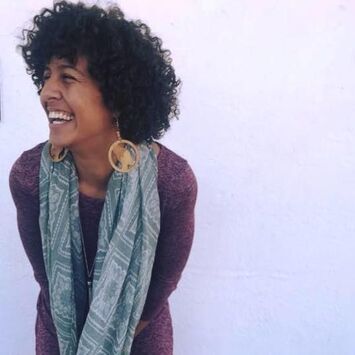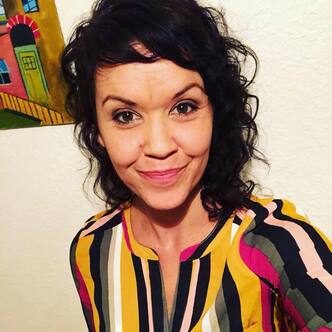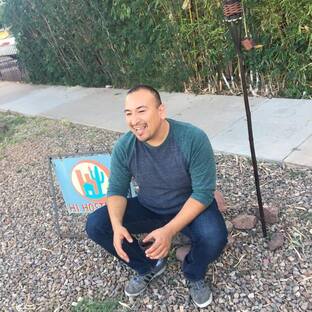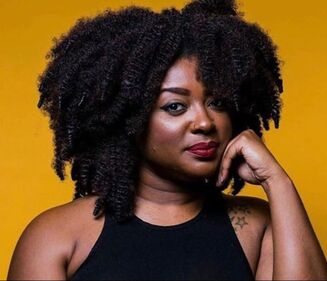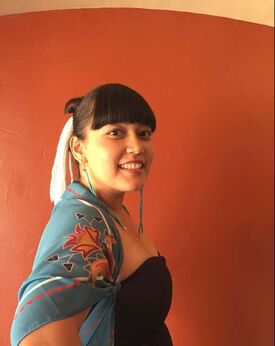Ashley Hare (they/them)Ashley is an administrator collaborating with artists, cultural workers, and organizers who share values in dismantling systemic oppression. They have worked in various states across the country training organizations, business, and government agencies on equitable practices within their programming for system-involved youth and adults in detention centers, foster care homes, school classrooms, and neighborhoods. Their practice centers civic arts and cultural engagements to shift power and voice to those supremacy, patriarchy, and capitalism continuously try to invisiblize. Ashley is also co-founder of ReFrame Youth Arts Center in South Phoenix. Ashley is also co-founder of ReFrame Youth Arts Center in South Phoenix.
|
Mary Stephens (she/her)Mary's practice engages civic engagement and cultural citizenship through the arts, with demonstrated ability to cultivate relationships with diverse communities locally, nationally and internationally. Mary's work advances visibility, representation, and power-sharing between local, state and national artists and organizations. Key to her method is leadership development, building strong partnerships, and intersectional approaches to institutional community engagement. Her curatorial work focuses on bi-national relationships between Mexico and the United States, and curating site-specific artistic experiences that address social issues.
Mary received her B.A. in Theatre from Arizona State University, and an M.A. in International Peace & Conflict Resolution from American University in Washington, DC. |
Joseph Larios (he/him)Joseph grew up a poor Gay Latino kid from the wrong side of the tracks. He watched his mom organize the community to fight back against gangs and drugs that had taken over the neighborhood. Seeing ordinary people accomplish extraordinary things was a powerful lesson.
Joseph graduated from Arizona State University, where he fought alongside construction workers at the Arizona AFL-CIO and co-founded the AZ Worker Rights Center to give workers the tools to stand up to harassment and wage theft. He went on to help form Central Arizonans for a Sustainable Economy (CASE) that developed community programs and municipal policy. He has brought the community together to have a voice at the ballot box and make politicians pay attention to our neighborhoods, which did more than change who represented our community, it set a higher bar for community engagement in city governance and ensured a voice for underrepresented communities. He has a Bachelors of Arts in Political Science from Arizona State University. |
Ebone Johnson (she/her)This Mississippi girl moved to the Valley 10 years ago and has had her hand in a little bit of everything-- but “all the things” made sense! She has a great passion for youth, the liberation of Black women, racial justice, HBCU (Historically Black Colleges and Universities) advocacy, educating and volunteering with teen girls of color, and all things art related. Ebone began her career as a medical translator/interpreter for Spanish speaking patients, moved on to being an Account Executive for a local radio station, progressed into entrepreneurship and becoming Program Director for a local non profit where her main focus was on the operational and sustainability opportunity of a group home for parenting and pregnant teen girls in the West Valley. She owns a local art business and enjoys traveling to re-focus and re-center herself on what it means to be a part of the bigger picture. Ebone is also the fundraising chair for the Greater Phoenix Urban League Young Professionals and takes great pride in volunteering and community focused initiatives. Ebone received her degree in Speech Communications from Jackson State University.
|
Jaclyn Roessel (she/her)Born and raised on the Navajo Nation, it is the wisdom of her homelands that shapes Jaclyn Roessel’s cosmovision. Experience early in her career as a museum professional, cultural arts producer and curator confirmed her belief of the inherent power of utilizing cultural learning as a tool to engage and build stronger communities. Molded by her grandmothers, Jaclyn has fostered a praxis that utilizes Indigenous ways of knowing and decolonized methodologies as a catalyst to build cultural equity in organizations across the country. Whether it is as the founder of her company Grownup Navajo as a cultural justice & equity consultant or in her poetic writings, Jaclyn is motivated by the pursuit of Indigenous excellence and the action to radically imagine futures where Native peoples’ lands and cultures are thriving, revered and protected.
Her work as a certified personal coach integrates her Diné perspective and belief in the inherent wisdom of her coach partners to navigate challenges and achieve healing transformation in their lives and work. Jaclyn is a co-founder of Native Women Lead, a former National Art Strategies Creative Community Fellow and Native Entrepreneur-in-Residence at New Mexico Community Capital. In her role as director of decolonized futures and radical dreams at the U.S. Department of Arts & Culture, she stewards the Honor Native Land Project and currently serves on the New Mexico Governor’s Council for Racial Justice. More about Jaclyn at Grown Up Navajo |

